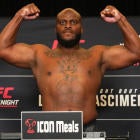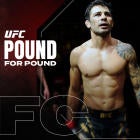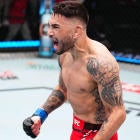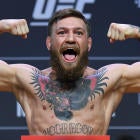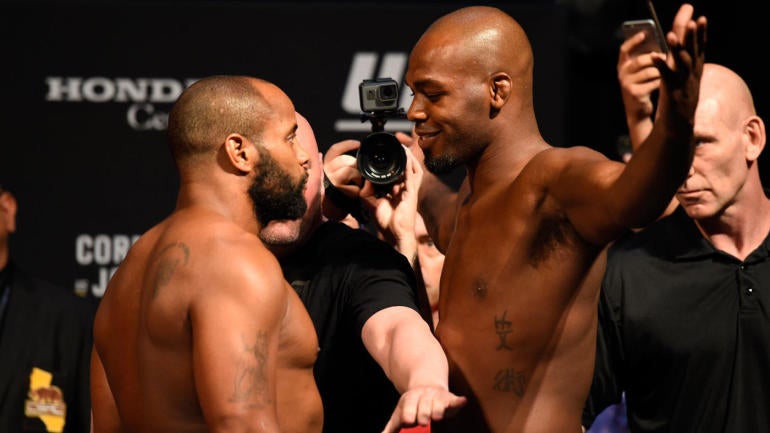
Jon Jones, the greatest light heavyweight in mixed martial arts, finally makes his heavyweight debut against Ciryl Gane at UFC 285 on Saturday. The move is three years in the making and has been discussed for much longer. That is for good reason, it's an incredibly challenging feat.
Jumping between weight classes is nothing new in the fight game, but escalating from light heavyweight to heavyweight is particularly daunting. There are 10-pound gaps between the six divisions from atomweight to lightweight. The scale increases to 15-pound increments from lightweight to welterweight and welterweight to middleweight, followed by a 20-pound gap between middleweight and light heavyweight. The jump from light heavyweight (205 pounds) to heavyweight is particularly challenging because the heavyweight limit tops out at 265 pounds. It is a massive escalation of physical threats and one that requires a more carefully implemented training regimen.
That is why so few fighters have made their names as dual contenders in the two heaviest divisions. In fact, Jones can make history as the first fighter to start his at light heavyweight to successfully capture the UFC heavyweight title if he overcomes Gane in Las Vegas. Jones' angle is exceptionally unique, but there are a select few who have found success at the highest level across MMA's two heaviest weight classes.
Can't get enough boxing and MMA? Get the latest in the world of combat sports from two of the best in the business. Subscribe to Morning Kombat with Luke Thomas and Brian Campbell for the best analysis and in-depth news.
Let's take a closer look at four fighters who paved the perilous path to the land of giants.
Alistair Overeem (Strikeforce, DREAM heavyweight champion)
Overeem is arguably the most successful example of a fighter that made the full-time move from light heavyweight to heavyweight. Overeem competed in an era where it wasn't unusual for combatants to fight every two months. He was trading blows with Antonio Rogerio Nogueira, Chuck Liddell, Igor Vovchanchyn, Mauricio Rua and Vitor Belfort by the quarter mark of his career. Overeem was a solid light heavyweight, but two failed Pride Grand Prix bids suggested he'd have trouble reaching the pinnacle of a division loaded with future legends of the sport.
Overeem made the full-time switch to heavyweight in 2007 following his first career losing streak. A shaky 1-1 start in his new weight class preceded a monstrous tear. Overeem won both the inaugural Strikeforce and DREAM heavyweight championships during his reign of terror, plus a kickboxing detour to become the 2010 K-1 World Grand Prix champion. Overeem stopped Fabricio Werdum, Mark Hunt, Todd Duffee, Brett Rogers and Paul Buentello, among others. Overeem grew into the heavyweight frame perfectly and evolved into one of the most decorated big men outside of the UFC.
Expectations were through the roof when Overeem signed with the UFC and dispatched former heavyweight champion Brock Lesnar in half of a round. Overeem found his footing after an unsteady 2-3 start and earned a UFC heavyweight title shot against Stipe Miocic. He came close to unseating Miocic but never captured UFC gold. Overeem ultimately fought 20 times in the promotion (67 MMA fights overall) and made a successful return to kickboxing in late 2022.
It's true that a UFC title is absent from Overeem's packed trophy case, but unlike some of his contemporaries on this list, he is by far the most successful of the bunch to exclusively move up in weight.
Daniel Cormier (UFC heavyweight, light heavyweight champion)
Cormier is an all-star, first-round pick if we expand the criteria to include fighters that started their careers at heavyweight and bounced between divisions. Cormier entered the Strikeforce Heavyweight Grand Prix in 2011 despite his own reservations about inexperience and size disadvantages. The Olympic wrestler scored a spectacular, unexpected knockout of Antonio Silva and dominated Josh Barnett to win the tournament in spite of self-doubt.
Cormier made his UFC debut in 2013 and soon after dropped to light heavyweight. The change of scenery was largely due to his loyalty to teammate Cain Velasquez, the UFC heavyweight champion at the time. Three fights into his light heavyweight run and Cormier was already fighting Jones, arguably the greatest to ever do it, for the UFC light heavyweight championship. Their rivalry ranks as one of the most bitter, bad-blooded feuds in combat sports and includes a physical brawl at the UFC 178 press tour. Cormier lost the fight, but Jones' subsequent encounters with the law and doping violations left a void that Cormier comfortably filled.
DC defeated Anthony Johnson for the newly vacated light heavyweight title in his next fight and made successful defenses against Alexander Gustafsson, Johnson and Volkan Oezdemir. He lost a rematch to Jones before the Oezdemir fight, but Cormier was reinstated as champion after Jones tested positive for a banned substance.
After beating Oezdemir, Cormier packed his light heavyweight title and planned a trip home to heavyweight. His best friend Velasquez had long been dethroned as champion and Cormier was ready to take the crown. Cormier met Stipe Miocic in a champ vs. champ heavyweight super fight at UFC 226 in July 2018. Cormier shockingly knocked out Miocic in Round 1 to become the second simultaneous champion in UFC history, behind only Conor McGregor, and is only one of four fighters to ever achieve the feat.
Randy Couture (UFC heavyweight, light heavyweight champion)
Couture might just be UFC's original badass. A three-time Olympic team alternate and three-time NCAA Division I All-American, Couture made his professional MMA debut at UFC 13 in 1997. A 4-0 start to his career included winning the UFC heavyweight championship and the finals of the UFC 13 heavyweight tournament. Couture had an extended run at heavyweight, which included a second stint as UFC heavyweight champion before he dropped down to 205 pounds.
Couture upset Chuck Liddell to win the interim UFC light heavyweight championship and subsequently beat Tito Ortiz to become the undisputed titlehilder. He briefly lost the title to Belfort but soon after recaptured the light heavyweight title and took the lead in their trilogy. Couture was in the title mix for almost the entirety of his 11-year fight career. He mastered the art of reinvention and after losing the light heavyweight title to Liddell, went straight back to heavyweight to take the title off Tim Sylvia.
Couture ultimately had three separate reigns as UFC heavyweight champion and two as the promotion's light heavyweight titleholder. And while he may not have a seat at the simultaneous champ table with Cormier, Couture can proudly proclaim himself an originator. There can only be one "first" and Couture is the first two-division world champion in not only the UFC but also in any major MMA organization.
Dan Henderson (Pride middleweight, welterweight champion)
Henderson only fought in the heavyweight division once, but what a performance it was. Henderson was a heavy-handed wrestler who won Pride championships in two weight classes and fought for both the UFC light heavyweight and UFC middleweight titles. Sandwiched between his nine-year UFC run was a four-fight stint in Strikeforce. Henderson captured the Strikeforce light heavyweight title and was subsequently paired with Fedor Emelianenko, arguably the greatest heavyweight in MMA history. There were speculations of a catchweight, particularly because Henderson had fought as low as 185 pounds.
"It's tough for me to gain weight," Henderson said in 2011, per MMA Weekly. "I did weightlifting and plenty of eating; I don't know what else I'm supposed to do. I'm not going to feel outmatched or small in there."
Henderson officially weighed in at 207 pounds, one pound over the minimum heavyweight requirement. Emelianenko came in relatively lean but was significantly larger at 223 pounds. Henderson's legendary power bridged the size gap as he knocked out "The Last Emperor" in Round 1. Henderson subsequently returned to UFC and nearly beat Michel Bisping for the middleweight championship in his final professional fight. Though Henderson never gave an encore at heavyweight, his brief cameo was wildly entertaining.













